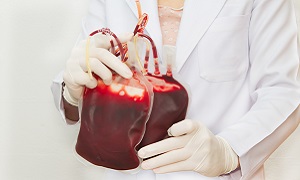Best Non-Hodgkin’s Lymphoma (NHL) Doctors in India
Here are the most reputed Haematologists and Medical Oncologists in India for the treatment of Non Hodgkin’s Lymphoma.
Best Non-Hodgkin's Lymphoma Hospitals in India
KIMS Hospital, Hyderabad
- City: Hyderabad, India
Hospital Highlights:
- KIMS Hospital (a brand name of Krishna Institute of Medical Sciences) is one of the largest and best multi-speciality hospitals in Hyderabad. The hospital provides various treatments to an enormous number of patients.
- The hospital has a capacity of more than 3000 beds. KIMS Hospitals offers different healthcare services in more than 25 specialities and super specialities.
- The hospital is equipped with modern medical equipment and technology. It has robotic equipment to provide minimal invasive techniques for patients.
- The hospital is aimed at providing world-class healthcare facilities and services at an affordable cost for patients.
- The various specialities and departments of the hospital include neurosciences, gastroenterology & hepatology, robotic science, reproductive sciences, dental science, oncological sciences, organ transplantation, heart and lung transplantation and mother and child care.
Fortis Hospital, Shalimar Bagh
- City: New Delhi, India
Hospital Highlights:
- Fortis Hospital in Shalimar Bagh is a multi-super specialty hospital that strives to provide world-class patient care by leaving no stone unturned.
- Fortis, Shalimar Bagh, with 262 beds and a 7.34-acre footprint, provides the best level of medical care through its team of doctors, nurses, technicians, and management professionals.
Reliance Hospital, Mumbai
- City: Mumbai, India
Hospital Highlights:
- Reliance Hospital is one of the best super-specialty care hospitals in Navi Mumbai.
- The main purpose of this hospital is to become a trustworthy place for the best health and hope for society. The hospital is well connected to the suburbs of Mumbai and Navi Mumbai.
- The hospital has various specialty departments, viz., Accident & Emergency, Anesthesiology, Dental Services, Dermatology, Diabetology, Dietetics Nutrition, Endocrinology, ENT, Gastroenterology, General Surgery, Gynaecology And Obstetrics, Hepato Pancreato Biliary Surgery, Infectious Disease, Internal Medicine, Interventional Radiology, Laboratory Medicine, Minimal Access Laparoscopic Surgery, Nephrology, Neurosciences, Opthalmology, Orthopaedics, Paediatrics, Pain Management Palliative Care, Physical Medicine Rehabilitation, Plastic And Reconstructive Surgery, Psychiatry, Pulmonary Medicine, Radiology, Rheumatology, Transplant, Urology Andrology, Vascular Surgery
Lilavati Hospital & Research Centre, Mumbai
- City: Mumbai, India
Hospital Highlights:
- Lilavati Hospital & Research Centre is India’s premier multi-speciality tertiary care hospital and has been recognised as a global medical excellence centre.
- Lilavati Hospital & Research Centre has built an unrivalled level of trust with its patients over the years, thanks to a solid foundation that comprises cutting-edge facilities, the best medical competence, research, education, and charity endeavours.
- The hospital is quite proud of the fact that it now serves patients from all kinds of backgrounds, not just from the United States but from all around the world.
- The hospital has a total of 323 beds, one of the largest Intensive Care Units (ICUs), 12 Operation Theatres with modern amenities, over 300 consultants, and almost 1,800 personnel.
Venkateshwar Hospital, Dwarka, New Delhi
- City: New Delhi, India
Hospital Highlights:
- State-of-the-art technology and devoted healthcare professionals have been brought together under one roof at Venkateshwar Hospital to provide genuine medical care. The hospital’s professionals work together as a team to deliver the best possible treatment to their patients, using the most sophisticated equipment and information technology.
- Venkateshwar Hospital’s mission is to attain global excellence in healthcare by employing evidence-based, ethical clinical practices and cutting-edge technology by a team of highly skilled experts.
MGM Healthcare, Chennai
- City: Chennai, India
Hospital Highlights:
- Located in Chennai, India, MGM Healthcare is a top multispecialty hospital that provides all medical services under one roof.
- Since its founding in 2019, MGM Healthcare has quickly become a leading national referral centre, creating several innovative flagship initiatives.
- MGM Healthcare combines next-generation medical and digital technologies to provide better patient results.
- With 12 centres of excellence, more than 400 inpatient beds, 100 intensive care unit beds, and 24/7 emergency care, MGM Healthcare leaves no chance in redefining the patient experience in Chennai.
- MGM Healthcare boasts 250+ expert doctors across 30+ departments, including Cardiology, Pulmonology, Neurology, Obstetrics & Gynaecology, and more.
- They house 12 specialized Centres of Excellence, including Neurosciences, Orthopaedics, and Multi-Organ Transplantation.
- Their team of doctors, nurses, and paramedics works together to give every patient individualized treatment.
Non-Hodgkin's Lymphoma
Non-Hodgkin’s Lymphoma is cancer originating from the lymphatic system of the human body. The lymphatic system fights the infections and spreads across our entire body. In this disease, the tumors develop from a type of white blood cells called lymphocytes. It is one of the two general types of lymphoma and is more common than Hodgkin’s Lymphoma. A type of abnormal cells called Reed-Sternberg cells help to differentiate between the two types of Lymphoma. These cells are only present in Hodgkin’s Lymphoma while they are absent in Non-Hodgkin’s Lymphoma. The treatment of the disease varies from Hodgkin’s Lymphoma.
Types of Non-Hodgkin's Lymphoma
There are various types of Non-Hodgkin’s Lymphoma. They are:
- B-cell Lymphoma – Reports suggest that around 85% of cases of Non-Hodgkin’s Lymphoma are that of B-cell Lymphoma. Diffuse, large B-cell Lymphoma is the most common type of B-cell Lymphoma. Other types of B-cell Lymphoma are Burkitt’s Lymphoma, lymphoplasmacytic mantle cell lymphoma, marginal zone B-cell lymphoma, extranodal marginal zone B-cell lymphoma, small lymphocytic lymphoma, mediastinal large B-cell lymphoma.
- T-cell Lymphoma – It affects around 15% of the population. It is of two types that comprise T-cells. They are peripheral T-cell lymphoma and cutaneous T-cell lymphoma.
- Follicular Lymphoma – It is a rare type of B-cell Lymphoma.
Causes of Non-Hodgkin's Lymphoma
While some doctors are unaware of the causes of Non-Hodgkin’s Lymphoma, some reports suggest that the weakened immune system causes this cancer. The body produces many abnormal lymphocytes (a type of white blood cell) that cause cancer. The lymphocytes do not undergo the normal cycle in the patient suffering from Non-Hodgkin’s Lymphoma. The lymphocytes, instead of dying, grow and multiply in Non-Hodgkin’s Lymphoma. These abnormal lymphocytes crowd the lymph nodes of the patient, and this causes the lymph nodes to swell.
- B-cells: Non-Hodgkin’s Lymphoma can begin in the B-cells. B-cells produce antibodies to fight germs and infections. These antibodies act against foreign bodies to protect the body. In most cases, cancer arises from B-cells.
- T-cells: T-cells kill the foreign bodies instantly and inhibit them from invading. Only a few cases of Non-Hodgkin’s Lymphoma occur in T-cells.
Symptoms of Non-Hodgkin's Lymphoma
One may find some symptoms that associate with Non-Hodgkin’s Lymphoma. These symptoms are:
- Persistent fatigue
- Unexplained weight loss
- Swollen lymph nodes present in the neck, armpit, and groin region
- Fever
- Chest pain
- Night sweats
- Abdominal pain
- Breathlessness and coughing
- Abdominal swelling
Diagnosis of Non-Hodgkin's Lymphoma
Although your symptoms indicate the presence of abnormal lymphocytes in your body, your doctor might need to perform some tests to form an accurate diagnosis and confirm the disease. Your doctor will ask about the medical history of your family & you and may also take down your personal history. Some tests and procedures follow the history-taking to diagnose Non-Hodgkin’s Lymphoma.
Physical inspection
Urine tests and blood tests
Imaging scans

Bone marrow tests
Testing of the lymph nodes

Treatment options for Non-Hodgkin's Lymphoma
Chemotherapy

Radiotherapy










